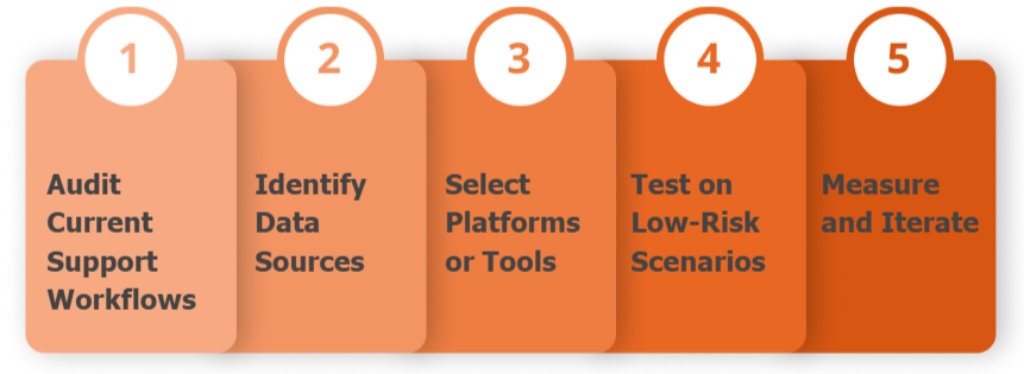
Go Beyond Chatbots: Implementing Advanced Predictive AI Models for Proactive Mobile User Support
Introduction
The era of chatbot-based reactive support is coming to an end. While it may come as a surprise to some, many saw it coming—traditional chatbots have started falling short in four fundamental areas:
- They require the user to initiate interaction, share a problem, and then suggest a solution—placing the burden of problem identification on users.
- They often need repeated inputs to gauge the issue.
- They have been less efficient on mobile devices, a primary touchpoint for modern users.
- Last, and perhaps most wasteful, they struggle with contextual awareness.
These issues, when combined with users’ expectations that companies should anticipate and adapt to their evolving needs, widen the gap between customer support expectations and reality. In this blog post, we will explore predictive AI as a solution that bridges this gap and transforms customer support from problem-solving to problem prevention.
From Chatbots to Predictive Intelligence: A Paradigm Shift
Until recently, chatbots were once considered fundamental to automated digital support—always on, always available. However, with democratized adoption came an increasing realization of their limitations in resolving issues beyond scripted answers and pre-programmed conversation flows. And this is where organizations began to adopt advanced AI models in mobile support.
They wanted to move beyond static automation and toward next-gen AI support systems that actively learn from user behavior, detect intent, and respond in real time.
What did they do? They integrated predictive AI models in mobile apps to access behavioral data, usage patterns, and contextual signals, and anticipate what the user actually needs. For example, consider AI personalization in mobile apps; a predictive AI system can proactively notify users about a failed transaction or offer live support if unusual behavior is detected before the user decides to reach out for the same.
Key Capabilities of Predictive AI in Mobile Support
Advanced AI models in mobile applications extend far beyond basic chatbot functionalities and play a central role in redefining customer engagement.
1. Intent Prediction & Query Anticipation
Predictive AI enables AI-powered mobile customer support systems to understand what users are likely to ask, even before they submit a query. It relies on hesitation patterns, repeated actions, and historical interaction data to anticipate what a user will ask and when.
Use Case: Consider a travel app. Integrating predictive AI models would enable it to recognize when a user searches for multiple destinations during a specific date range but doesn’t book, prompting the system to offer assistance with comparing options or finding better rates.
2. User Journey Mapping & Pattern Recognition
With advanced AI models in mobile support, businesses can track user paths across the app to identify recurring patterns and drop-off points, and see where they struggled to perform a certain action. With this knowledge, timely and context-aware support interventions will reduce the likelihood of attrition.
Use Case: For instance, consider a crowdfunding application. Predictive AI models for such mobile apps can analyze how users navigate their loan application flow, specifically their common drop-off point, let’s say, the income verification step. This revealed pattern can highlight confusion around document upload formats or data privacy concerns. With this knowledge, AI-powered mobile customer support can intervene to offer assistance or clarify doubts.
3. Personalized Recommendations in Support Flows
When intervention is necessary, predictive AI personalization in mobile apps delivers support tailored to each user’s unique profile.
Use Case: For a banking app user who consistently uses voice commands and has previously struggled with transfer limits, the predictive AI support system might offer audio-based guidance on authorization steps with specific mentions of daily limits.
Where Does Predictive AI Fit in the Customer Support Stack?
Many organizations confuse next-gen AI support systems with a replacement for their existing support infrastructure, but this is not the case. It is a strategic layer that enhances and connects it with other elements within that infrastructure. Therefore, understanding where predictive AI fits within your broader support stack is crucial for successfully implementing predictive AI for mobile user support.
1. Omnichannel Use Across All Touchpoints
Predictive AI serves as the intelligence layer that supports all channels.
- Live chat: Anticipates user questions based on real-time page interactions and browsing history, preloading relevant responses for agents or triggering proactive engagement.
- Help desk: Enriches tickets with predictive insights about user intent and potential solutions before agents engage.
- Email: Analyzes message content and user history to prioritize issues and suggest personalized responses.
- Voice systems: Predicts caller intent based on previous interactions, providing agents with likely scenarios before conversations begin.
2. Plays Well With Core Support Infrastructure
As predictive AI models for mobile customer experience are designed to complement, not replace, they can easily integrate with other support systems:
- CRM Systems: Enrich customer profiles with behavioral insights and predicted needs, helping agents understand the full customer context.
- Knowledge Bases: Dynamically prioritizes and surfaces relevant articles based on predicted user needs rather than just keyword matching.
- Ticketing Systems: Augment ticket routing and prioritization based on predicted issue complexity and customer impact.
- Analytics Platforms: Provide forward-looking insights about emerging support trends and potential issue clusters.
3. Supports Both Human and Virtual Agent Performance
Next-gen predictive AI support systems help both human and AI support agents. For human agents, they can provide real-time guidance on how to deal with certain customer issues, suggest personalized responses, and inform them in case potential escalation scenarios occur.
For virtual agents, they can create dynamic conversation paths, develop outreach strategies to connect with users before they come to report problems, and facilitate smoother information handoffs between automated systems and human support specialists.
Business Value: How Predictive AI Drives Results?
In addition to being a technical upgrade, predictive AI-powered mobile customer support delivers tangible business value.
Faster Issue Resolution & Reduced Support Costs
By proactively recognizing user intent and surfacing corresponding answers, predictive AI-powered mobile customer support dramatically shortens the time it takes to identify and prevent user queries. When issues do require actual support, predictive AI provides agents with contextual information and relevant solutions immediately. With such a prompt response and resolution, over 72% of users continue to stick with a company/service provider.
Higher CSAT & NPS Scores
Integrating AI personalization in mobile apps builds trust. When users receive fast, relevant, and personalized assistance, without having to repeat themselves or wait in support queues, customer satisfaction (CSAT) and net promoter scores (NPS) improve.
Proactive Retention & Reduced Churn
Another benefit of implementing AI for mobile user support is its ability to step in before users actually leave an app or service. Most often, when such an event is about to happen, there are certain obvious signs of user frustration, such as extended inactivity, recurring support requests, or repeated clicks on a certain button. Predictive AI models can track such patterns and prompt your support network to initiate relevant interventions to re-engage the user.
Improved Agent Efficiency
Predictive AI also works as a workforce multiplier. It greatly reduces the manual effort required to categorize incoming questions, give relevant responses, prioritize tickets based on urgency and severity, and highlight upsell or cross-sell opportunities.
Laying the Foundation for Predictive AI in Mobile Customer Support

To realize the above benefits at scale, you need a structured AI deployment approach. Here’s how to move from strategy to seamless implementation.
Audit Current Support Workflows
Evaluate your existing support processes to identify gaps, repetitive and unresolved queries, and other inefficiencies such as delayed responses. This will give you an idea of where to integrate predictive AI models for mobile support.
Identify Data Sources
AI’s success depends on the quality of training data. Identify your data sources and map out available data, such as CRM records, email queries, session analytics, and mobile app behavior. Use this data to train and feed your chosen AI models. However, make sure it is clean, organized, and properly labeled.
Select Tools or Platforms: Self-Serve Platforms or Professional AI/ML Development
When to use an AI platform: If your team has strong AI expertise—knowledge of algorithms, training methods, and model tuning—you can utilize platforms like Azure AI or AWS SageMaker. These tools work best when paired with a clean, structured dataset containing relevant queries and responses. They offer pre-built models that can be customized to fit your support needs.
When to outsource AI/ML development: If you want to save time and don’t have the requisite resources or expertise, you can also opt for AI development services. Many companies use this strategy to gain from their established workflows, pre-established QA benchmarks, and specialized teams of AI/ML developers and prompt engineers. The risks involved in implementing predictive AI in mobile support are also decreased by working with reputable vendors.
Test on Low-Risk Scenarios
Before implementing AI for mobile user support, begin with a controlled rollout and for a risk-free use case, like tracking orders. This will help you validate the model’s performance before full-scale implementation.
Measure and Iterate
Determine relevant KPIs to gauge model performance. You can track average resolution time, reduction in ticket volume, CSAT, etc. You can then periodically retrain the AI model to enhance its outcomes.
The limitations of traditional chatbots have made one thing clear: reactive support is no longer sufficient in a mobile-first world where users expect seamless, personalized, and proactive assistance. As explored throughout this blog, predictive AI models for mobile support offer a powerful shift, moving from answering problems to anticipating them, enhancing every stage of the support journey.
Looking ahead, the role of predictive AI in mobile customer support will go beyond current capabilities. We can expect context-aware AI systems that not only understand user intent but dynamically adjust tone, channel, and even response timing. It is safe to say that the future of customer support isn’t just automated, it’s intelligent, anticipatory, and deeply human in experience.


